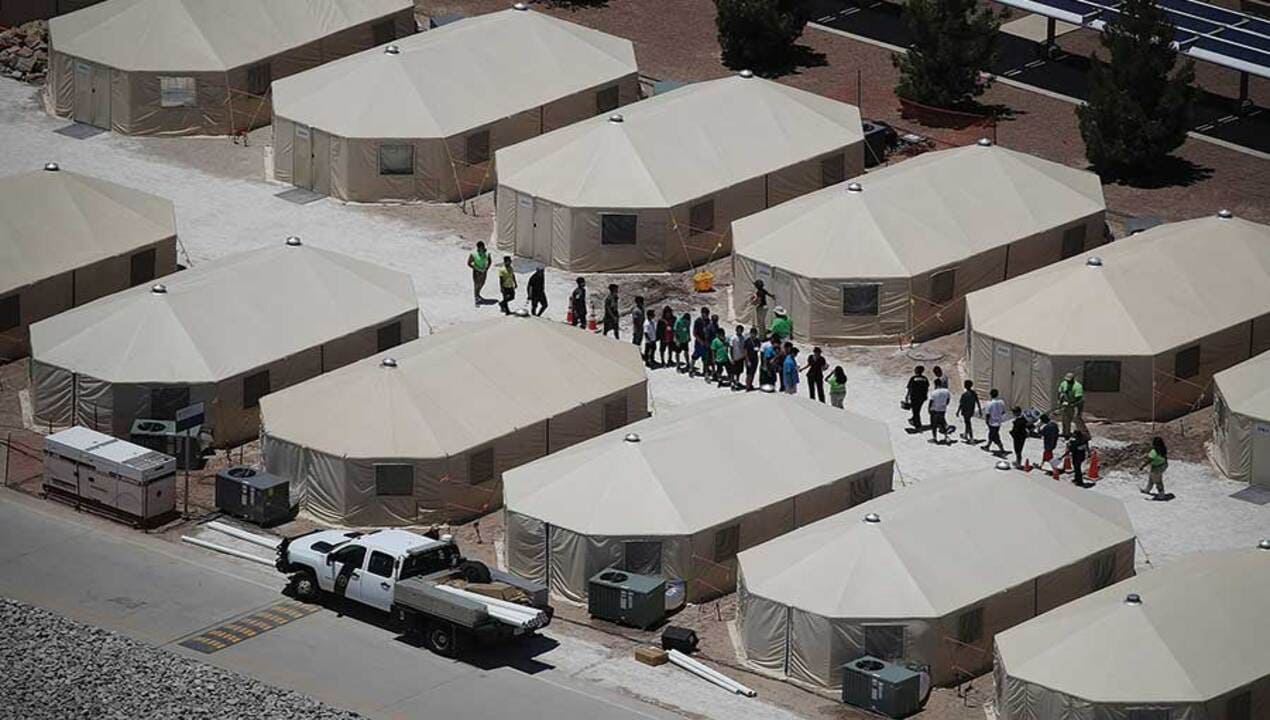
Independent Report – The U.S. Immigration and Customs Enforcement (ICE) agency is accelerating efforts to build migrant tent camps across the country following a significant funding increase of $45 billion. According to a report by The Wall Street Journal, ICE plans to more than double its detention capacity. Expanding from the current 40,000 beds to 100,000 by the end of the year. This rapid expansion aims to address the growing number of migrants in custody.
Documents reviewed by The Wall Street Journal reveal that ICE is focusing on establishing large tent facilities at various locations. Including military bases and existing ICE detention centers. One of the major sites under development is a 5,000-bed camp at Fort Bliss in Texas. Additional large-scale tent camps are also being planned in states such as Colorado, Indiana, and New Jersey. The goal is to create enough space to house the increasing number of detainees in a more efficient manner.
A senior official from ICE told Reuters that the agency is exploring every possible option to increase its bed space capacity. This expansion effort includes the use of certain military bases to house detainees temporarily. However, specific details about the plan have not been officially confirmed by the agency.
Homeland Security Secretary Kristi Noem and other top officials within the Department of Homeland Security have shown a preference for detention centers that are managed by Republican-led state and local governments. This is seen as an alternative to relying on private prison companies. Which have traditionally played a role in managing detention facilities. The move reflects a political dimension in how the government is approaching the issue of immigration detention.
Also Read : Stephen Colbert and Late-Night TV’s Financial, Political Decline
Last week, Secretary Noem mentioned ongoing discussions with five Republican-led states regarding the construction of new detention sites. These new facilities would be modeled after the so-called “Alligator Alcatraz” in Florida. Adetention center that has gained attention for its unique design and security features. Noem noted that several other states have expressed interest in partnering with the federal government based on the Florida model. Though she did not disclose the names of these states during a press briefing.
The push to expand detention facilities comes amid ongoing challenges faced by the U.S. immigration system. Rising numbers of migrants attempting to cross the border and enter the United States have strained existing resources. Detention centers have struggled with overcrowding, leading to concerns about conditions for those held in custody. The government’s strategy to rapidly increase bed space reflects an urgent response to these pressures.
The use of military bases for migrant housing is a notable aspect of this expansion plan. Historically, military installations have occasionally been used for temporary detention during immigration surges, but this marks one of the largest efforts to convert such facilities into large-scale tent camps. The move has generated mixed reactions from the public and advocacy groups, with some expressing concern over the humanitarian implications of detaining migrants in tent facilities.
While ICE has not publicly confirmed all details of the expansion, the agency’s senior officials have acknowledged the need to increase capacity quickly. The scale of the funding boost indicates the government’s commitment to addressing what it views as an urgent immigration enforcement priority. At the same time, officials emphasize that they are exploring various solutions to manage the situation effectively.
The funding also reflects broader political dynamics surrounding immigration enforcement. Republican-led states’ involvement in managing detention centers aligns with the current administration’s emphasis on stricter immigration controls and partnerships with local governments. This approach diverges from reliance on private prison operators, which have faced criticism over conditions and accountability.
As the plans move forward, questions remain about the long-term impact of these expanded detention facilities. Advocates continue to call for more humane treatment of migrants and for policies that address root causes of migration rather than focusing solely on detention and enforcement. Meanwhile, government officials maintain that expanding bed space is necessary to maintain order and security in the immigration system.
In summary, ICE is undertaking an unprecedented effort to expand its detention capacity by building large tent camps, many on military bases, supported by a substantial funding increase. The agency is prioritizing partnerships with Republican states for facility management and is drawing inspiration from existing models like Florida’s “Alligator Alcatraz.” While details are still emerging, this rapid expansion reflects the government’s urgent response to ongoing immigration challenges and its focus on increasing enforcement infrastructure nationwide.
Also Read : Astronomer CEO, Andy Byron Caught Getting Cozy with Colleague at Coldplay Concert